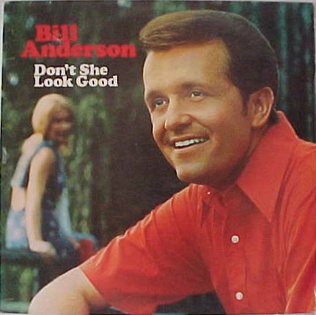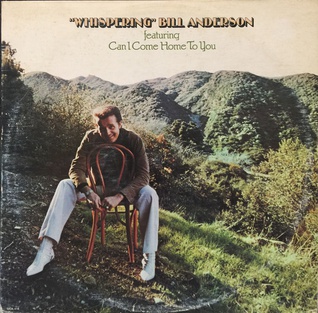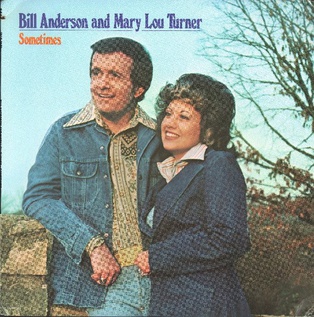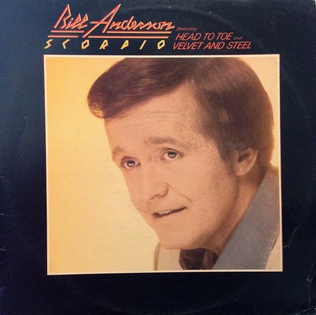
James William Anderson III is an American country music singer, songwriter, and television host. His soft-spoken singing voice was given the nickname "Whispering Bill" by music critics and writers. As a songwriter, his compositions have been covered by various music artists since the late 1950s, including Ray Price and George Strait.
"Peanuts and Diamonds" is a song written by Bobby Braddock. It was first recorded by American country singer-songwriter Bill Anderson. It was released as a single in 1976 via MCA Records and became a major hit the same year.
"Liars One, Believers Zero" is a song written by Glenn Martin. It was first recorded by American country singer-songwriter Bill Anderson. It was released as a single in 1976 via MCA Records and became a major hit the following year.

I Can Do Nothing Alone is a studio album by American country singer-songwriter Bill Anderson. It was released in June 1967 on Decca Records and was produced by Owen Bradley. It was Anderson's seventh studio record and his first album to consist entirely of gospel music. Although the album did not produce any singles, it made peak positions on the Billboard country albums chart.

Don't She Look Good is a studio album by American country singer-songwriter Bill Anderson. It was released in November 1972 on Decca Records and was produced by Owen Bradley. The album was Anderson's twentieth studio recording to be issued. It was also his fourth studio album released in 1972. Two additional projects were collaborations with Jan Howard earlier in the year. The album's only single was the title track, which became a major hit on the country charts.

Bill is a studio album by American country singer-songwriter Bill Anderson. It was released in July 1973 on MCA Records and was produced by Owen Bradley. It was Anderson's first studio album to be released on the MCA label after Decca Records merged with the label. It was also his twenty first studio recording to be released and only album project to be issued in 1973. The album included three singles, two of which became number one hits in either the United States and Canada. The album itself also would reach peak positions on national publication charts.

"Whispering" Bill Anderson is a studio album by American country singer-songwriter Bill Anderson. It was released in June 1974 on MCA Records and was produced by Owen Bradley. The album's only single was the track "Can I Come Home to You". It was also his twenty-second studio recording and only album issued in 1974.

Sometimes is a studio album by American country music artists Bill Anderson and Mary Lou Turner. It was released in January 1976 on MCA Records and was produced by Owen Bradley. It was Anderson's twenty fourth studio recording and Turner's first. The album's title track became a major hit on the country charts in both the United States and Canada. The album also reached major positions on the country chart in the United States. Sometimes was the first collaborative project between Anderson and Turner. Anderson hired Turner to work as his duet partner during this period and the project was one of two recordings they made.

Peanuts and Diamonds and Other Jewels is a studio album by American country singer-songwriter Bill Anderson. It was released in September 1976 on MCA Records. It was co-produced by Owen Bradley and Buddy Killen. It was Anderson's twenty fifth studio recording released during his musical career and second to be released in 1976. The album included three singles issued between 1975 and 1976, two of which became major country hits in both the United States and Canada.

Scorpio is a studio album by American country singer-songwriter Bill Anderson. It was released in April 1977 on MCA Records and was produced by Buddy Killen. Scorpio was Anderson's 26th studio album as a recording artist and first album release of 1977. Another album would follow later in the year. The project produced two singles that became major hits.

Ladies Choice is a studio album by American country singer-songwriter Bill Anderson. It was released in 1979 on MCA Records and was produced by Buddy Killen. His 29th studio album, Ladies Choice, produced two singles that became charting singles on the Billboard country chart. It included a mix of songs composed by Anderson and other songwriters.

Nashville Mirrors is a studio album by American country singer-songwriter Bill Anderson. It was released in 1980 on MCA Records and was produced by Buddy Killen. His 30th studio album, it was also Anderson's final album effort with his long-time record label. The album included three singles that reached minor positions on the Billboard country songs chart.
"If You Can Live with It " is a song written and recorded by American country singer-songwriter Bill Anderson. It was released as a single in 1973 via MCA Records and became a major hit the same year.
"Can I Come to You" is a song written by Jerry Crutchfield and Buddy Killen. It was recorded by American country singer-songwriter Bill Anderson. It was released as a single in 1974 via MCA Records and became a major hit the same year.
"Every Time I Turn the Radio On" is a song written and recorded by American country singer-songwriter Bill Anderson. It was released as a single in 1974 via MCA Records and became a major hit the same year.
"I Still Feel the Same About You" is a song written and recorded by American country singer-songwriter Bill Anderson. It was released as a single in 1975 via MCA Records and became a major hit the same year.
"Thanks" is a song written by Bill Martin and Phil Coulter and first recorded by J. Vincent Edwards in 1969. Edwards recording charted in the Netherlands. American country singer-songwriter Bill Anderson's version was released as a single in 1975 via MCA Records and became a major hit the same year.
"That's What Made Me Love You" is a song written by Lawrence Shoberg. It was first recorded as a duet by American country artists Bill Anderson and Mary Lou Turner. It was released as a single in 1976 via MCA Records and became a major hit the same year.
"Make Mine Night Time" is a song written by Mike Kosser and Curly Putman. It was first recorded by American country singer-songwriter Bill Anderson. It was released as a single in 1980 via MCA Records and became top 40 hit single.
"Country D.J." is a song written and first recorded by American country singer-songwriter Bill Anderson. It was released as a single in 1975 via MCA Records and became top 40 hit single.










